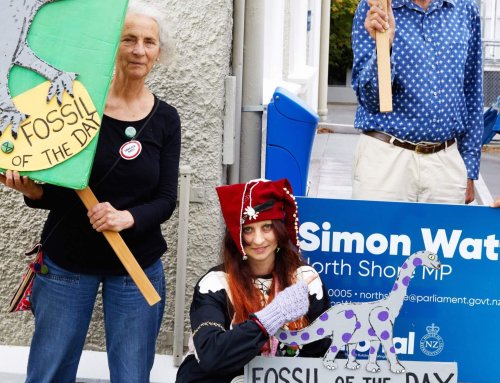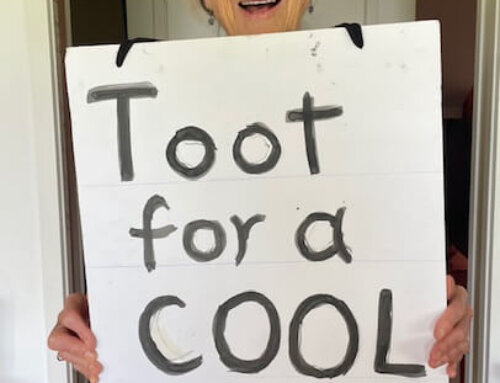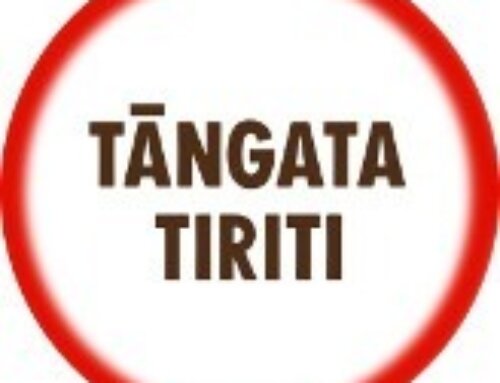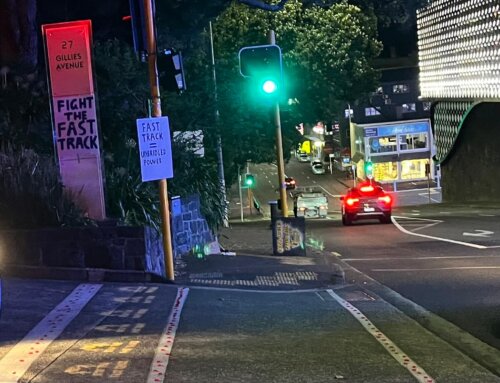Around 60 members of Extinction Rebellion Te Whanganui-a-Tara gathered in Parliament grounds this afternoon to protest against intensive dairy farming and the associated land damage, greenhouse gas emissions, freshwater pollution, health impacts and species extinction. The action was highlighted by an address from esteemed freshwater ecologist Dr. Mike Joy, and ended with litres of (biodegradable, non-toxic) “sour milk” being poured down the steps of Parliament.
Spokesperson Jamie Hoare opened proceedings with a series of passionate statements about the destructive force that is intensive dairy farming in New Zealand. He said, “There’s a sour side to our white gold. It’s time to face the people who profit from the damage to our fertile land and the destruction of clean waterways caused by the dairy industry. Some farms are moving to less destructive practices, but there are many who are not, or still have a long way to go.
“And even if all dairy farms used the very best practices, the fact remains that intensive livestock farming is environmentally damaging by its very nature. Not just from methane and nitrous oxide emissions, but also from soil compaction, from incredibly high levels of water use, and from the fact that it is a hopelessly inefficient way to produce protein compared with cropping.
 “It is also fitting that today is the International Day of Peasant’s Struggle. Peasant farmers worldwide are facing increasing violence and displacement as multi-national corporate behemoths like Monsanto, enabled by national governments, force them to use their seeds and weed killers, and eventually force them from their land.
“It is also fitting that today is the International Day of Peasant’s Struggle. Peasant farmers worldwide are facing increasing violence and displacement as multi-national corporate behemoths like Monsanto, enabled by national governments, force them to use their seeds and weed killers, and eventually force them from their land.
“New Zealand is a highly active member, with Fonterra, of the worldwide corporate campaign to adopt destructive and inefficient forms of industrial agriculture, and we are seeing family farms being increasingly taken over in this manner.”
Dr Joy spoke of the terrible damage to our land and waterways caused largely by intensive dairying. He said that if the real costs of dairy farming were actually paid, there would be no profit at all from it. Instead, it is costing us our and our children’s future.
He pointed out that dairy farming depends on massive amounts of fossil fuels for its fertilisers, and over 2 million tonnes of palm kernel per annum for feed – which contributes directly to the huge burnoffs of tropical rainforests going on, mainly in Indonesia.
Lakes Taupo and Rotorua are currently protected from dairy runoff by the payment of $130M to farmers so they would not farm on the surrounds of the two lakes. This is paid for by taxpayers and, if the scheme was extended across New Zealand, it would cost Kiwis $24B.

Dr Joy said that there were many facts and figures he could give, all of which pointed to New Zealand causing itself – both, people and the environment – terrible, catastrophic damage. His summary was that if he could design the worst dairy farming system from scratch, with all he knew after 2 decades of researching its impacts, he could not imagine a way we could make it any more damaging than it is now. Mr Hoare says, “This needs to stop. We are literally killing our future and the future of my toddler sitting over there.”
Both speakers were greeted with loud moos of support from a grazing herd of dairy cattle (a rare sight on Parliament’s lawns), which were echoed by their peasant herders and the other rebels. The herd peacefully grazed on Parliament lawn for a time after the speeches, until a breakaway group headed by a bovine rebel (for life) headed for the barriers. These rebel cows expressed their displeasure with their lot, and with the politicians who refuse to get serious about changing this destructive system, by emptying their white gold – which had gone green, and sour – onto Parliament’s steps, from which it slowly trickled down to the lawn. A symbolic image how “trickle-down economics” always go sour.
Extinction Rebellion Wellington demands that our government:
• Stops enabling the intensive dairy industry’s destructive land and water management practices,
• Creates and observes much stricter water quality standards, and
• Takes much stronger and more immediate action to clean up our sour milk industry, helping our
farmers transition to a sustainable model.




